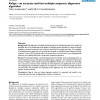Free Online Productivity Tools
i2Speak
i2Symbol
i2OCR
iTex2Img
iWeb2Print
iWeb2Shot
i2Type
iPdf2Split
iPdf2Merge
i2Bopomofo
i2Arabic
i2Style
i2Image
i2PDF
iLatex2Rtf
Sci2ools
149
click to vote
BMCBI
2005
2005
Kalign - an accurate and fast multiple sequence alignment algorithm
Background: The alignment of multiple protein sequences is a fundamental step in the analysis of biological data. It has traditionally been applied to analyzing protein families for conserved motifs, phylogeny, structural properties, and to improve sensitivity in homology searching. The availability of complete genome sequences has increased the demands on multiple sequence alignment (MSA) programs. Current MSA methods suffer from being either too inaccurate or too computationally expensive to be applied effectively in large-scale comparative genomics. Results: We developed Kalign, a method employing the Wu-Manber string-matching algorithm, to improve both the accuracy and speed of multiple sequence alignment. We compared the speed and accuracy of Kalign to other popular methods using Balibase, Prefab, and a new large test set. Kalign was as accurate as the best other methods on small alignments, but significantly more accurate when aligning large and distantly related sets of sequenc...
Related Content
| Added | 15 Dec 2010 |
| Updated | 15 Dec 2010 |
| Type | Journal |
| Year | 2005 |
| Where | BMCBI |
| Authors | Timo Lassmann, Erik L. L. Sonnhammer |
Comments (0)

